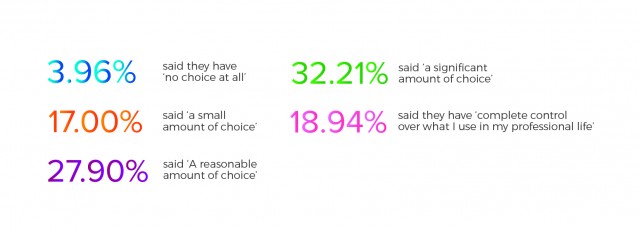For many years, technology in large organizations has been defined by established vendors. Oracle. Microsoft. Huge corporations were setting the agenda when it came to the technology being used by businesses. These tech organizations provided solutions – everyday businesses simply signed themselves up.
But this year’s Skill Up survey painted an interesting picture of a world in which developers and tech professionals have a significant degree of control over the tools they use.
This is how people responded when we asked them how much choice they have over the tools they use at work:
Half of all respondents have at least a significant amount of choice over the software they use at work. This highlights an important fact of life for tech pros, engineers and developers across the globe – your job is not just about building things and shipping code, it’s also about understanding the tools that are going to help you do that.
To be more specific, what this highlights is that open-source is truly mainstream. What evolved as a cultural niche of sorts in the late nineties has become fundamental to the way we understand technology today.
Yes, it’s true that large tech conglomerates like Apple, Facebook, and Google have a huge hold on consumers across the planet, but they aren’t encouraging lock-in in the way that the previous generation of tech giants did. In fact, they are actually pushing open-source into the mainstream. Facebook built React; Google are the minds behind Golang and TensorFlow; Apple have done a lot to evolve Swift into a language that may come to dominate the wider programming landscape.
We are moving to a world of open systems, where interoperability reigns supreme. Companies like Facebook, Google, and Apple want consumer control, but when it comes to engineering and programming they want to be empowering people – people like you.
If you’re not convinced, take the case of Java. Java’s interesting, because in many respects it’s a language that was representative of the closed systems of enterprise tech a decade ago. But it’s function today has changed – it’s one of the most widely used programming languages on GitHub, being used in a huge range open source projects. C# is similar – in it you can see how Microsoft’s focus has changed, the organization’s stance on open source softening to become more invested with a culture where openness is the engine of innovation.
Part of the reason for this is a broader economic changes in the very foundations of how software is used today and what organizations need to understand. As trends such as microservices have grown, and as APIs become more important to the development and growth of businesses – those explicitly rooted in software or otherwise – software necessarily must become open and changeable. And, to take us back to where we started, the developers, programmers, engineers who build and manage those systems must be open and alive to the developing landscape of software they can use in the future.
Decision making, then, is a critical part of what it means to work in software. That may not have always been the case, but today it’s essential.
Make sure you’re making the right decision. Read this year’s Skill Up report for free.










![How to create sales analysis app in Qlik Sense using DAR method [Tutorial] Financial and Technical Data Analysis Graph Showing Search Findings](https://hub.packtpub.com/wp-content/uploads/2018/08/iStock-877278574-218x150.jpg)
